Internet marketing has changed the world, letting us connect with clients not only in other countries but even on different continents. Our reach can extend further than ever, but that has ironically made it more difficult for small local businesses to connect with their target audience.
In last week’s #SEMrushchat, we discussed all things local SEO with Geek Powered Studio’s director of SEO, Jesse McDonald, including strategies to improve your site’s local SEO and how to stay in the race on a limited budget. Check out what Jesse and our other chat participants had to say in the recap below.
Q1. When it comes to local SEO, what are the most important elements that should be on your website?
While there are plenty of strategies that you can use to rank well for local searches, you should always start with a good foundation on your website. According to our experts and chat participants, the following are the most important elements that are non-negotiable if you want to rank well for local SEO:
NAP
Every page on your site should contain highly visible and consistent contact information for your business, including your business’s name, address, and phone number. This is all about making it easy for users to get in touch with you at any point in the funnel. These should be apparent in the header, and/or marked up in the schema (or coding) so that it is easy for Google to find and show users who are still browsing on the search engine.
A1) NAP (correct and consistent) on every page and the same as GMB, Schema, Geo-specific content with localised keywords/themes... #semrushchat
— David Rosam (@davidrosam) March 14, 2018
A1: For local SEO, you need an updated knowledge graph on your website detailing address, phone number and description. Also, having a Google+ business page is something you cannot afford to miss #SEMrushchat
— Kapil Sharma (@ImKapil_Sharma) March 14, 2018
A1. Another vote for 'NAP' data - but embedding a Google Map with directions can send pretty strong signals to 'the Big G' about where you are. Have seen this work really well for lots of small local businesses. #semrushchat
— Ⓞⓟⓣⓘⓜⓘⓢⓔⓨ (@Optimisey) March 14, 2018
A1: always use structured markup on your business entity as well #SEMrushchat
— Danny Ray Lima (@dannyraylima) March 14, 2018
A1: 1st rule for local is to assure you have your Nane, Address & Phone Number present and either marked-up in schema or in JSON in the header. Make sure the NAP’s are consistent with all your local citations and GMB listing. #semrushchat
— Shelly Fagin (@shellyfagin) March 14, 2018
A1 For Local SEO,The elements that should be on your site include mail postal code formated address. Organization, local business, and geocoordinates schema; Authoritative Information about your Business #SEMRushChat
— Bill Slawski ⚓ (@bill_slawski) March 14, 2018
Develop a Well-Targeted Hierarchical System
When users come to your site (and when Google analyzes it), you want there to be a clear, well-targeted hierarchical system for your pages. There should be a simple layout with clear call-to-actions that make it easy for users to get in touch with you. Simple contact forms, clickable phone numbers, or maps that automatically launch Google Maps to give users directions to your business, are all great examples. The easier you make it for users to come to you, the more likely they will.
A1 Creating a well targeted hierarchal system for your page layout with clear call-to-actions, elements that make it easy for users to contact you (like clickable phone number for mobile), and markup data (location information, social assets, same as). #semrushchat
— Jesse McDonald (@jesseseogeek) March 14, 2018
A1. Another vote for 'NAP' data - but embedding a Google Map with directions can send pretty strong signals to 'the Big G' about where you are. Have seen this work really well for lots of small local businesses. #semrushchat
— Ⓞⓟⓣⓘⓜⓘⓢⓔⓨ (@Optimisey) March 14, 2018
Location Title Tags
Title tags are the HTML elements that tell you the title of your web page. Including your location in those tags can immediately be registered by Google, helping you to show up in relevant searches when people are looking for it. This is the type of indicator that search engines value, so it is a great way to incorporate geo-focused keywords on the back end of your site in a way that Google will respond to it.
Smart Keyword Optimization
Most businesses understand the importance of keywords, but local SEO’s keyword research may look just a little bit different. They may include more geo-focused keywords (“Seattle plumber” instead of just “plumber,)” making it easy for people to find local services.
It is also important to consider the language that your audience uses, taking into consideration that different areas may use different vernacular when searching for your services or businesses. Think of how some people call soda “coke” or “pop” depending on where they live and consider if your target audience would use different language to search for your services than you are currently using. You may also realize that while “fire restoration” is the correct term for what your business offers, “fire clean up” is what almost all your clients are searching for. Place these keywords in content, page titles, and metadata for best results.
A1 localised keywords - research whats the local vernacular is - might be different to where you are. #SEMRushChat
— Simon Cox (@simoncox) March 14, 2018
Internal Linking
Internal linking can give you an SEO boost, and it can also help you send relevant traffic bouncing around on your own site until they have the information they need to convert.
Claim Local Citations
Location citations are any mention of your business online, including the business’s name, address, or phone number. Google and Yelp may list your business even if you haven’t, for example, and users may check in at your business on Facebook before it has even been created. Claim these citations and take ownership of the pages where appropriate, linking them to your site.
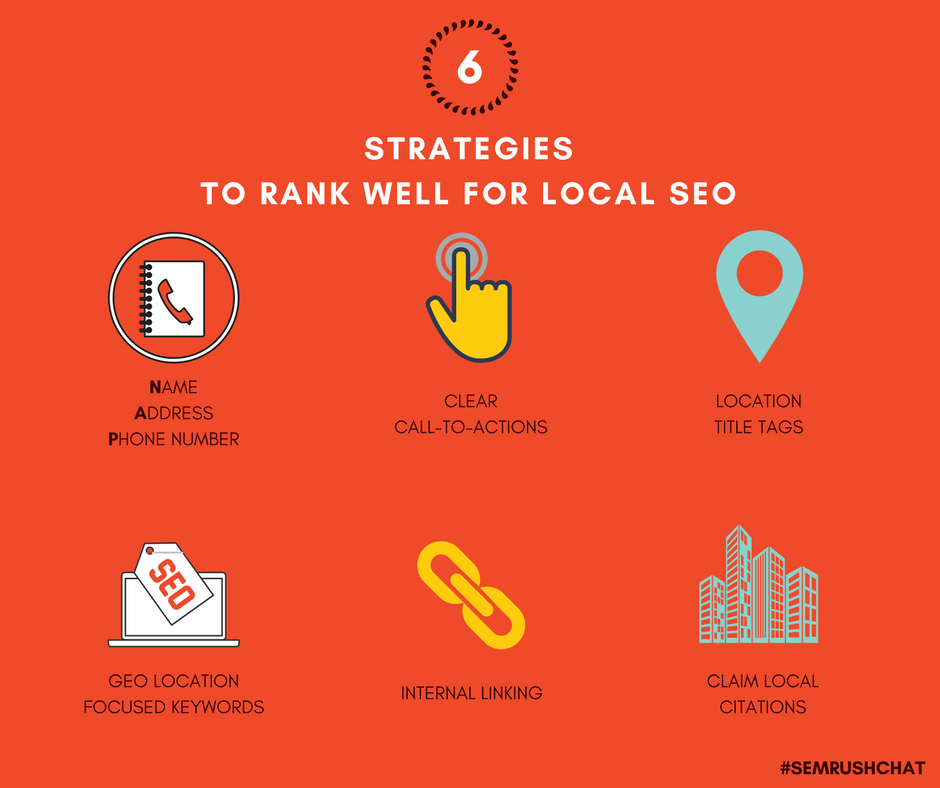
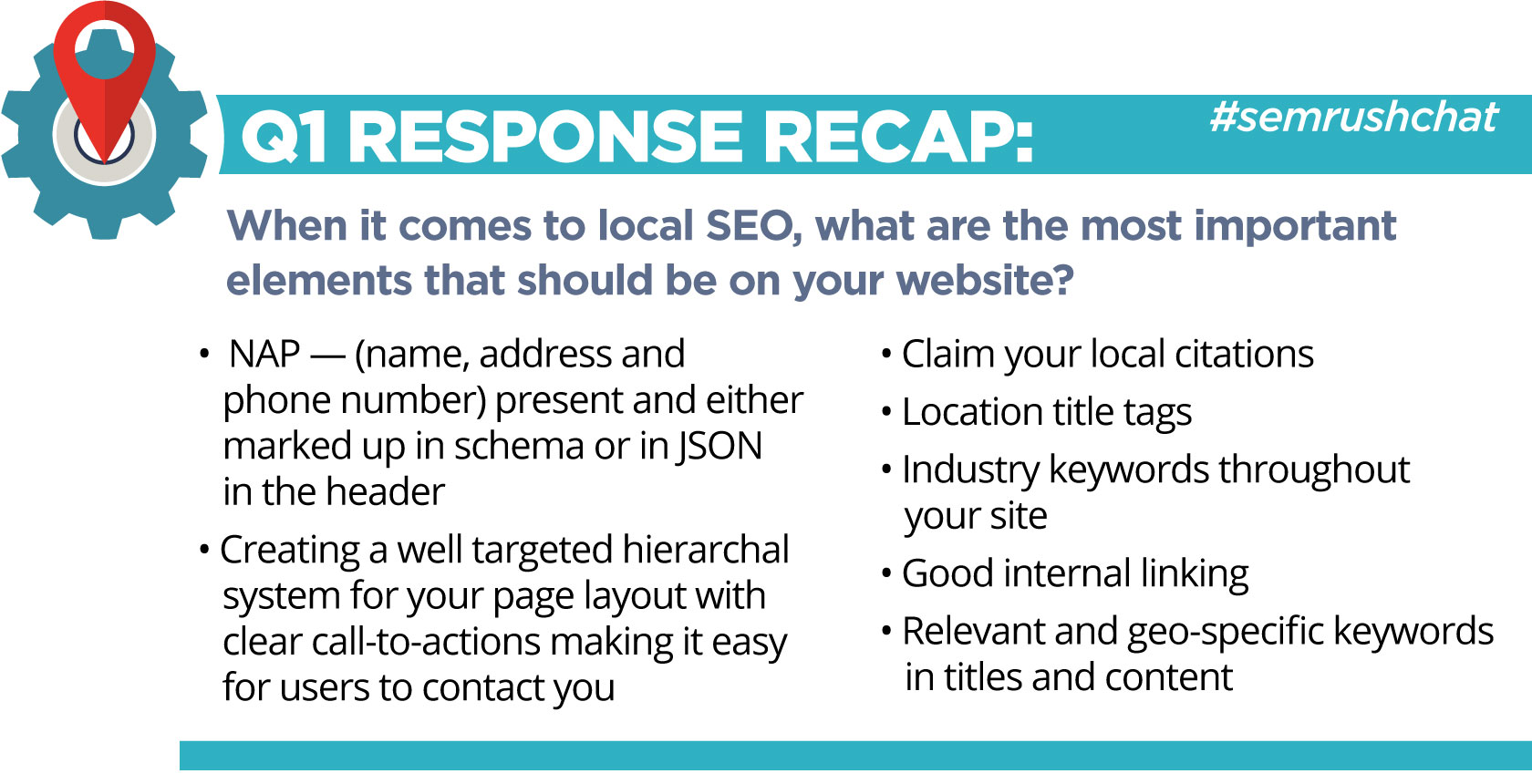
Q2. Google Business Profile Scenario: A former employee posted fake reviews that don’t show your business in a good light. What is the best course of action?
Even the greatest businesses, brands, and products will likely have a negative review at some point. It is almost inevitable, whether it comes from a disgruntled past employee who was fired for never showing up on time or a customer who was angry that you wouldn’t let them return their microwave after a year had passed.
There are several things that you can do to tackle the situation head-on.
The first step is to try to flag the review as being false. If you can get it flagged as spam or false, you could potentially get it removed. Google has a system of reporting false reviews, and it is now against their guidelines for former employees to leave reviews for a business.
A2 Inform Google of the Source of those reviews as being from a former employee. They are now against Google's Guidelines: https://t.co/ySUjdHtUR0 #SEMRushChat
— Bill Slawski ⚓ (@bill_slawski) March 14, 2018
A2: A few ways to address this:
1) Report it to Google2) Reply and explain this is fake3) Hire someone good at reputation management to bury it... ;-) #semrushchat
— Andy Drinkwater (@iqseo) March 14, 2018
A2: With any negative review left by someone who wasn’t a customer I would always first report the review in the off chance Google agree’s it violates their review guidelines. They’ve recently said former employees are not allowed to review their employers. #SEMRushChat
— Shelly Fagin (@shellyfagin) March 14, 2018
A2: Negative reviews from ex-employees are against Google’s guidelines. We can simply flag the reviews and we can request google to remove these reviews source: https://t.co/XeOPCn0EeB #semrushchat
— Ashok Sharma (@Ashok83) March 14, 2018
A2: I think the assumption is that the negative comments are false. If so, flag, report & respond w/out malice. If true: have the self awareness to change policies or practices #semrushchat
— JP Sherman (@jpsherman) March 14, 2018
A2. Current or former employees are not allowed to leave reviews period. It doesn't matter if they are positive or negative. https://t.co/Bi1yRAE0Or via @JoyanneHawkins #semrushchat
— Jason Brown (@keyserholiday) March 14, 2018
A2. Flag the review in your GMB dashboard, wait 3 days then tweet GMB support for help. @GoogleMyBiz Can take 2 weeks to resolve #semrushchat
— Jason Brown (@keyserholiday) March 14, 2018
If you are unable to get the review taken down (or while you are waiting to find out), respond publicly to the comment. Reply cordially, informing them that you were unable to find them in your customer database and provide them a method of contacting you to resolve the situation. Since it is a fake review, they will likely drop it at that point, and at least other users will see that you have tried to remedy the situation as quickly as possible. For many users, this counts for a great deal, and it shows them that you take client feedback seriously.
A2 First, try to flag these reviews as being false and see if you can go about getting them removed.If that doesn’t work, reply very cordially saying that you don’t see them in your customer database and to contact you so you can help resolve the solution. #semrushchat
— Jesse McDonald (@jesseseogeek) March 14, 2018
A2 Be it positive or negative, it’s always a good to acknowledge every review, but when you’re dealing with fake malicious reviews, be careful in how you handle them. Don't lash out at critics, it will do more harm for your company image. Do it in a constructive way. #semrushchat https://t.co/ZasNxy3t7s
— Goddess of Tweets (@tweeterellaah) March 14, 2018
a2) You can flag the review, but as a practice, you should also answer clearly and positively to all reviews - good or bad. #semrushchat
— Ryan Johnson (@rsj8000) March 14, 2018
A2: I would highly recommend to flag the review, but if you need to reply, be professional and show the public you are reaching out to resolve and take feedback through the appropriate channels #semrushchat
— Danny Ray Lima (@dannyraylima) March 14, 2018
A2. 1. Respond to the reviews publicly explaining the situation/other side of the story. #SEMrushchat
— Reva Minkoff (@revaminkoff) March 14, 2018
A2: Respond to the review in a cordial manner. Not responding leads users to believe that the review is true. Also, attempt to flag the review to be removed #semrushchat
— Cy De la Vega (@cy_atx) March 14, 2018
A2: If you know FOR SURE it was a former employee, flag that s*** to try to get it removed. But don't let it sit there in the meantime. Respond to the review with a well-composed, objective message and perhaps reiterate your mission statement. Think of it as PR. #semrushchat
— Ashley Bovin (@aruthbovin) March 14, 2018
A2: Respond to the review - users will see your response along with the negative review. Can turn a negative into a positive. #semrushchat
— Michael Hall (@allmikehall) March 14, 2018
A2: Think it's important to respond even if you flag the review & follow all the other steps.Responses show potential customers,clients, employees you are listening #SEMRushchat
— Kevin Doory (@KevinDoory) March 14, 2018
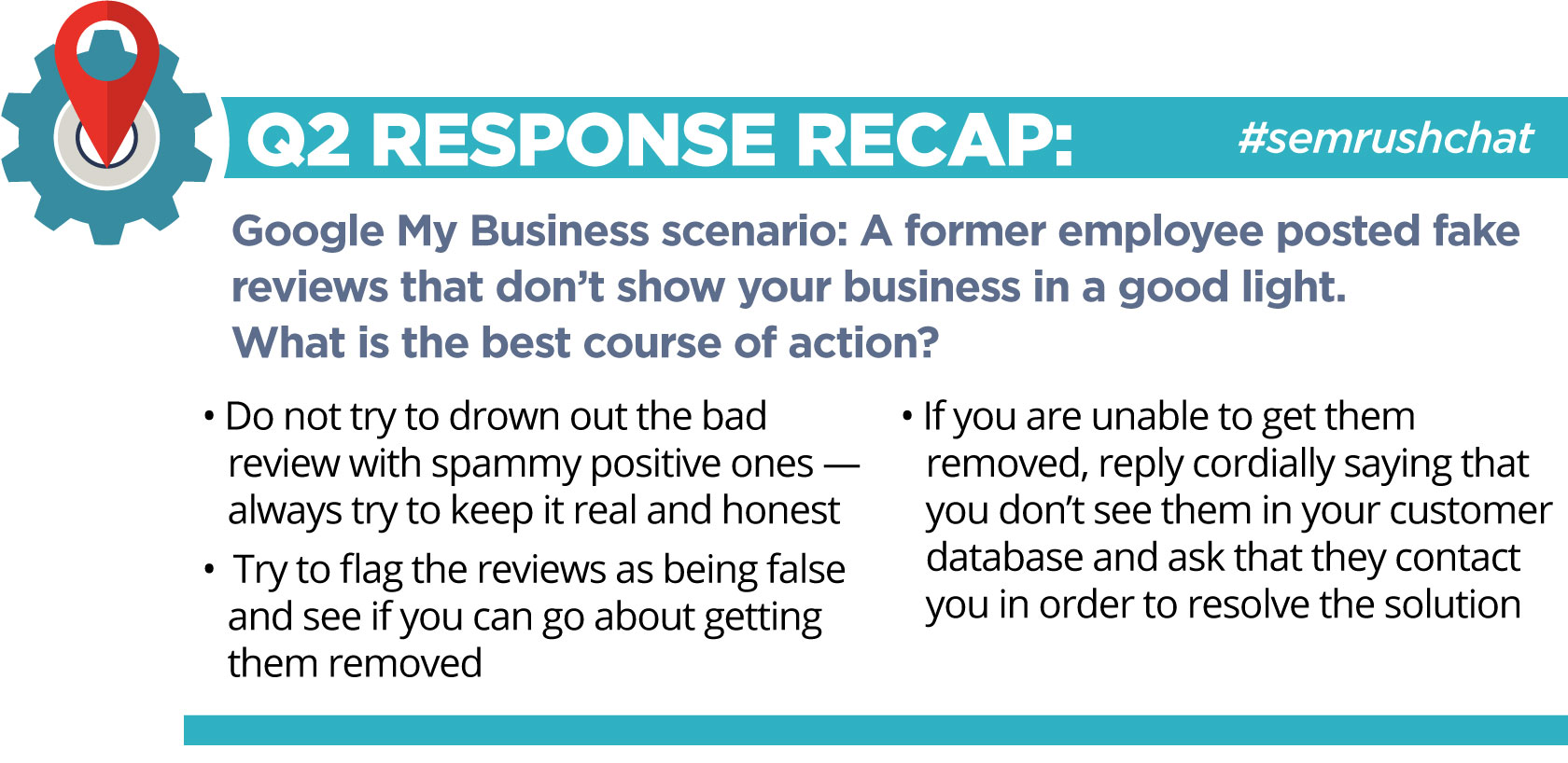
Whatever you do, don’t try to drown out the bad review with a bunch of spammy positive ones that you or your employees are leaving. These are easy to spot, and may actually turn off customers even more than the single negative review. Keep it honest and authentic, because consumers are smarter than ever before, and they will spot self-promotional reviews.
Q3. What can a local business with one location do to ensure it ranks across multiple target cities?
Many local businesses can service, deliver to, or are relevant to more than one city, even if they only have one location. Because of this, focusing on only a single city could end up isolating enormous numbers of audience members who live outside of it. Once you have established yourself in your primary area, it is time to start branching out.
A3. 1st focus on ranking for all of your terms in your area before focusing on other areas. Own your market first #semrushchat
— Jason Brown (@keyserholiday) March 14, 2018
First, clearly list all the communities you serve on your site in an easy-to-see place. If you advertise yourself as a “Seattle Carpet Cleaning,” make sure you list that you also serve the six surrounding cities if you do, and which they are.
A3 Definitely be careful about creating pages that could be considered doorway pages.That being said, create content that speaks to how your services can help that specific area, like with blog posts.Listing these areas as service areas can also help. #semrushchat
— Jesse McDonald (@jesseseogeek) March 14, 2018
A3. Create content that is geotargeted and explains why you're better than the folks down the street.
Speak to pain points, like being farther away.
Most importantly - invest in the community you're targeting. #semrushchat https://t.co/RX4Z4uq8ti
— ???? ?. ??????, ???. (@ferkungamaboobo) March 14, 2018
A3: I'd advise not only having a [service keyword]+[city name] template - but I'd start with focusing on customer comments, stories, media that occured in that different city. #semrushchat
— JP Sherman (@jpsherman) March 14, 2018
#SEMrushchat a3 in my experience: if a client does not have a location in the specific target region you will need to focus on technical local content to add value. If you are a pluber- local water quality and local codes. Electrican - specific city codes or power providers
— mitch (@mitchitomouse) March 14, 2018
Try to incorporate these additional cities in your SEO strategy, including utilizing keywords or creating blog posts relevant to them. Some of our chat participants mentioned creating location pages for each location, but this should be done carefully since Google has gotten strict on location packs. Do this in a way that won’t violate their regulations, because the last thing you want is to get hit with a penalty.
A3: Unique and optimized content that answers the needs of the residents of your targeted cities. If possible, gather reviews specifically from that city and display them on that page to gather trust #semrushchat
— Cy De la Vega (@cy_atx) March 14, 2018
A3: remember that google is looking for topical expertise. create media & content about the different ways your *thing* makes those places better #semrushchat
— JP Sherman (@jpsherman) March 14, 2018
A3: Up your geotargeting game and create relevant content that speaks to the cities you are targeting. #semrushchat
— Perfect Search Media (@Perfect_Search) March 14, 2018
A3: This is a challenging one. Too many people utilize dangerous tactics to accomplish this. If you serve a lot of business in other cities, it’s best to establish a actual location there so you can have GMB listing and create localized pages with that address. #semrushchat
— Shelly Fagin (@shellyfagin) March 14, 2018
A3: Generate landing pages and content that target the intended communities. I would also run a small AdWords or AdWords express campaign to help #semrushchat
— Danny Ray Lima (@dannyraylima) March 14, 2018
A3: Create location pages. It's isn't the ideal scenario, but does work. With this, it helps to get local links and citations as well. Make sure your location pages talk about that location as well - you will need more than just a page title and brief description #semrushchat
— Andy Drinkwater (@iqseo) March 14, 2018
Many small businesses feature directions to their business on their Contact Us page. Include directions from multiple different cities, interstates, and landmarks. Place these next to an embedded Google Maps widget that will automatically pull up directions for your customers for best results.
Q3 Include directions from nearby Cities and Landmarks. Offer specials to people who might travel to your location from other nearby places. Host Partnered events with people at other places. Become known in those other cities. #SEMRushChat
— Bill Slawski ⚓ (@bill_slawski) March 14, 2018
A3: Create city/region landing pages - /city-one /city-two etc. #semrushchat
— Michael Hall (@allmikehall) March 14, 2018
You can also build relationships with other businesses or organizations in nearby local cities where you aren’t yet established. This can encourage those businesses to mention you on social media or provide valuable backlinks, giving you more traffic. You can also host partnered events with these businesses to build in-person relationships with their clientele, too.
A3: Also join local organizations like each cities Chamber of Commerce. Show that you are active in that community. #semrushchat
— Shelly Fagin (@shellyfagin) March 14, 2018
A3: Get links / citations from a variety of sources who focus in those areas. BBBs, local organizations. Link to your site's content focused on community interaction. #semrushchat
— Kevin Doory (@KevinDoory) March 14, 2018
A3) Have content centered around the multiple targeted cities (not spamming) and create link-building strategies for each page #SEMrushchat
— Nathan Driver (@natedriver) March 14, 2018
If you are looking for a particularly fast solution, pay per click (PPC) ad campaigns can help with this. Facebook Ads, Instagram Ads, Promoted Pins, and Google AdWords all allow you to target specific zip codes, cities, and regions. You can target multiple cities in a single ad campaign, or create individual campaigns targeting each city. These ad campaigns can be effective, even if you are on a small budget; just allocate the budget to be distributed across multiple days and campaigns if necessary.
A3 serious) Try with quality geotargeted content. If Google is having nothing of it (it can be picky these days), then it's PPC and perhaps paid social if it fits the business and audience. #semrushchat
— David Rosam (@davidrosam) March 14, 2018
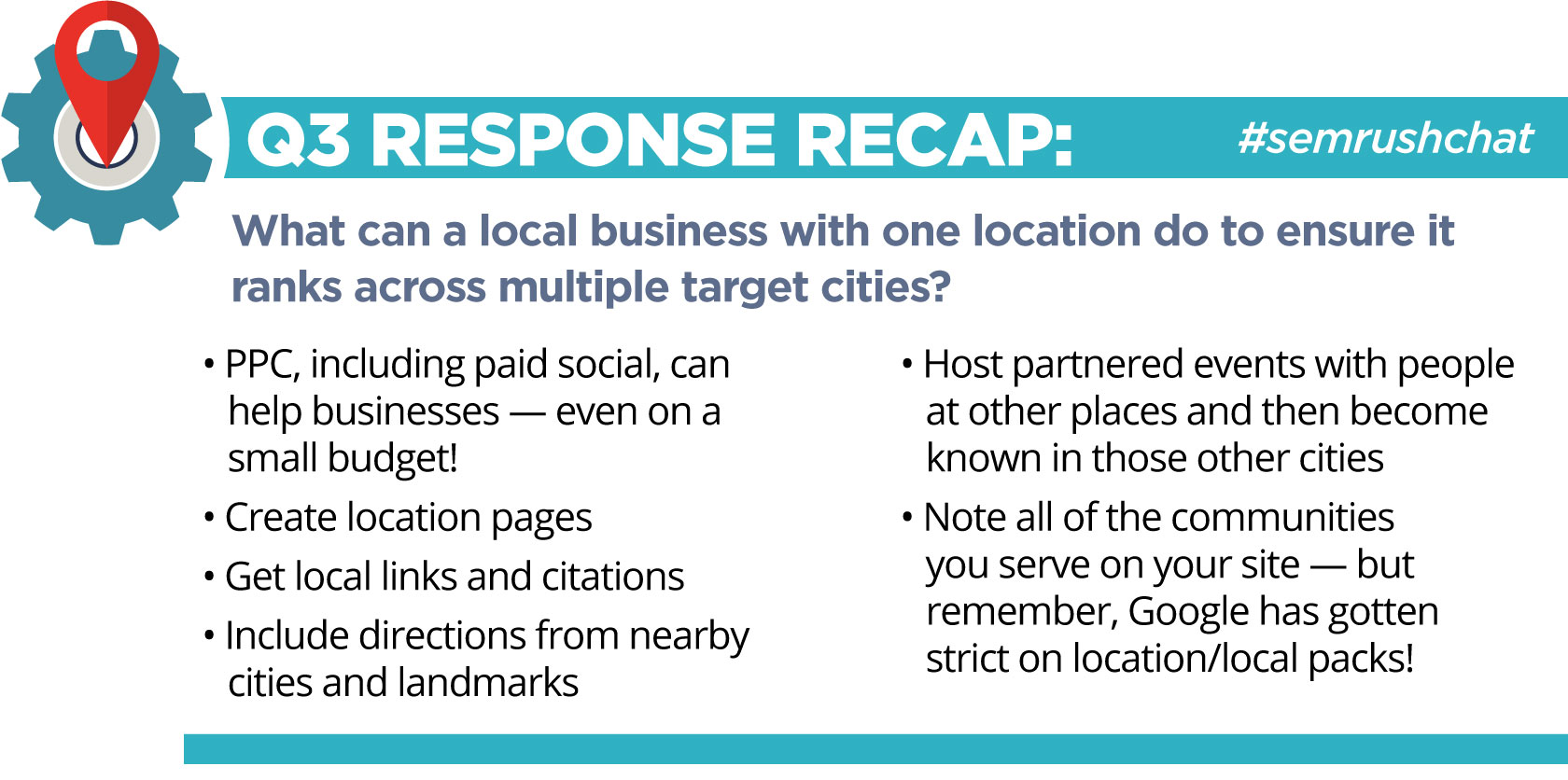
Q4. How can a local business win the search battle with a limited budget?
Being on a tight budget is never fun, but that doesn’t mean you should throw in the towel. Local businesses are capable of being exceptionally competitive in the search battle even if their marketing budget is a little on the smaller side, as long as they implement the right strategies.
To start, you should take advantage of every free or cheap resource that you have available. This means registering in the local directories (many of which are free) so that you will pop up when people are searching for them. You should also make sure that your business pops up on Google+, Google Maps, and Bing by registering accordingly. On each of these sites, place consistent NAP info that matches your site so people can easily get in contact no matter what touchpoint they find you at.
A4. Use the new GMB post feature, chances are big brands are not utilizing it as the api is only available for under 10 locations in GMB dashboard, yes I am bitter. #semrushchat
— Jason Brown (@keyserholiday) March 14, 2018
A4: This is where you can really make the most of Google My Business as many businesses don't realise the huge amount of options that now exist on there. Add quality images, Q&As, Google Posts are just a few examples. #SEMrushchat
— Heather Harvey (@Fizzle_Up) March 14, 2018
It also never hurts to call in a few favors. Reach out to other local companies that you have collaborated with or built relationships with. Offer to promote them if they help promote you, sharing content on your social media sites or trading links. When possible, attend in-person events with these businesses or in the local communities. This can go a long way in helping you build links early on, and will be much more valuable than overpriced PPC or PR agencies.
a4) Avoid: phony link building pitches, overpriced agencies. #semrushchat
— Ryan Johnson (@rsj8000) March 14, 2018
A4: To win the local search battle, you need to think local and be local, and that doesn't apply to just an online presence, have an offline presence that can generate buzz online within your local communities. Host events, like workshops, meetups. #SEMrushchat
— Danny Ray Lima (@dannyraylima) March 14, 2018
A4: for the price of a small month long PPC campaign a sm. biz could buy baseball pants for a kid's team, deliver them & create media around it for their site. doing well by being good. #semrushchat
— JP Sherman (@jpsherman) March 14, 2018
If you can generate reviews from your customers, it can also work in your favor. More and more review-focused site plugins are now making sure that those reviews are crawlable by search engines. If you are using these tools on your site and someone searches for “Best Gelato Ever,” they could see an authentic review left by one of your customers.
A4 I think maps and reviews will have an impact on the search rankings. #semrushchat
— Krishna Rg (@krishnarg22) March 14, 2018
You should also create a content strategy that will help you stand out. Great, evergreen content that is valuable and unique is almost guaranteed to earn you backlinks, especially once you target the right keywords and find the right distribution methods to grow your audience quickly. (For many, social media and industry forums are a great place to start for distribution). If you are just starting out and don’t have a lot of authority, try to focus on long-tail keywords that have low competition but high intent. As you are continually putting out great content that gets backlinks, traffic, and shares, you will see your rankings in SERPs increase.
A4 This is where organic initiatives come in as they only cost you time.Try to put your business name out there on major online publications in your area and create link building strategies that are user focused.Be active in your community #semrushchat
— Jesse McDonald (@jesseseogeek) March 14, 2018
A4: Try contributing your knowledge your writing helpful articles for local publications, create simple videos answering your customers most frequently asked questions, hold a Google hangout. #semrushchat
— Shelly Fagin (@shellyfagin) March 14, 2018
A4 Local businesses should focus on local-based and longtail keywords with high intent and lower competition. For example, a local bike store should target "bike accessories for kids" (2,400 searches per month) versus just "bike accessories" (42,000 searches). #SemRushChat
— Knucklepuck (@KnucklepuckDC) March 14, 2018
A4. Make sure it's easy for people to share - online and offline - about your business. #SEMrushchat
— Reva Minkoff (@revaminkoff) March 14, 2018
A4: #SemRushChat I would say key in on the most vital keywords... consider more specific ones vs. broad ones, and narrow that "Advertising Zone" to an area where you think it's reasonable for people to come and see you. Don't get lost looking to hit too much. pic.twitter.com/ZQrvBapKYc
— Colt Sebastian Taylor (@ColtSTaylor) March 14, 2018
A4: By consistently creative consumer-centric, valuable content. If you can create content that solves a problem, answers a question or touches on hot topics, you’re going to be able to tap into the market & provide value to your audience. #SEMRushChat
— Maria Marchewka (@_MariaMarchewka) March 14, 2018
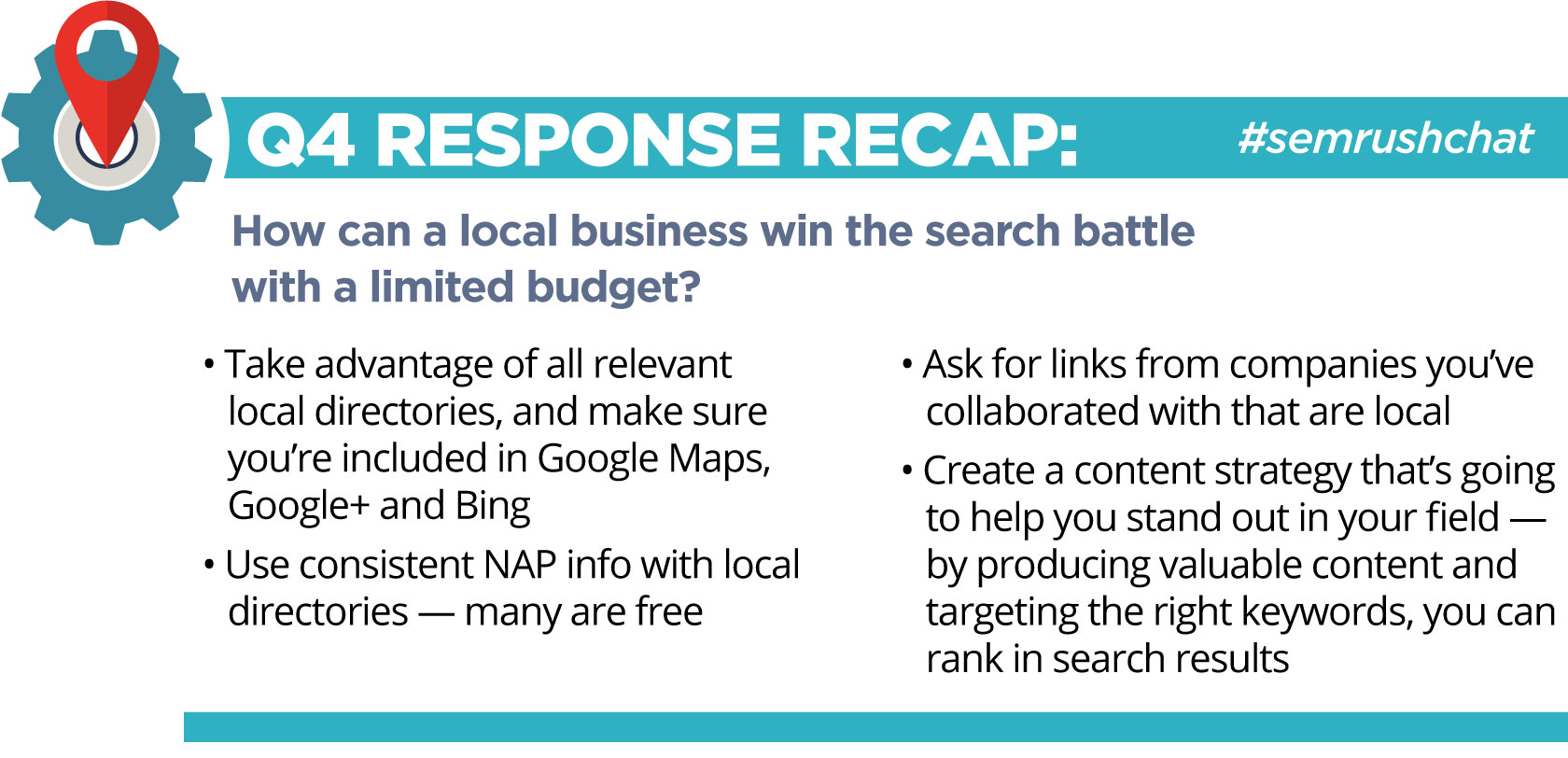
Q5. In your opinion, how will voice-based search impact local SEO?
Voice-based search is becoming increasingly important, with more users asking Siri and Alexa to answer questions instead of manually searching for answers themselves. It’s affected what phrasing is being used, and what keywords you should be using. As one user pointed out, people are no longer searching “weather forecast,” they are asking their smart devices “is it going to rain today?”
A5: Voice search is going to increase with more homes adopting smart home features. So making sure you rank well in matters that affect the home means a lot such as asking smart devices to make lists and order products you've ran out of etc. #semrushchat
— Kieran Ledger (@KJLedger) March 14, 2018
A5. Google voice is leading to more q&a queries. #semrushchat
— Reva Minkoff (@revaminkoff) March 14, 2018
Totally. Some stats here on local, related to voice and connected devices: https://t.co/DeeNIDbE8i. The graph shows "Houston weather forecast" vs "is it going to rain today". I haven't' seen UK specific data, have you Dawn? #SEMrushchat pic.twitter.com/pnOQVRwwXl
— Mike Jeffs (@Mikerjeffs) March 14, 2018
Ideally, incorporate more long-tail, question-based keywords that contain more natural, casual language. This will help you rank well with selective voice search results. If you can anticipate what questions your audience will ask, you can go out of your way to provide the answer, too. Make sure you tune in with the specific dialect and language they’ll be using for best results. Adjust your content marketing strategy accordingly, and remember that reviews could be included in this, too.
A5: Create your own questions/answers within your GMB. Explore the Q&A's to see where your competitors are missing, then provide answers. Voice search answers questions, give G the answers #semrushchat
— Kevin Doory (@KevinDoory) March 14, 2018
A5: It's really changing how we search. Not only is it more convenient, but we tend to phrase our voice searches differently than we do when typing. #semrushchat
— Express Writers (@ExpWriters) March 14, 2018
A5 Search Results could be personalized based upon recognizing local accents and dialectic choices (soda vs. Pop!) #SEMRushChat
— Bill Slawski ⚓ (@bill_slawski) March 14, 2018
A5: Voice is going to open up how sites and content rank. Marketers who can build content around the way that people talk will excel. #SemRushChat
— Maria Marchewka (@_MariaMarchewka) March 14, 2018
A5: Reviews will also be important to voice search for some industries, as people may be searching for the "best" restaurant/coffee shop/roofing company/etc. locally. #semrushchat
— Ashley Bovin (@aruthbovin) March 14, 2018
When it comes to local business, voice search should be an important consideration for local businesses, especially as more users are finding your business through “near me” searches. That being said, with smart devices getting smarter, more users will ask for Alexa to find them a plumber, and they no longer really need to add “near me.” As one chat participant aptly put it, local intent is now assumed instead of needing to be stated outright.
A5 Voice search will make a huge impact on users finding your business through “near me” searches.If your business provides content that answers questions users might have regarding your type of service, they could also see this information more in voice searches. #semrushchat
— Jesse McDonald (@jesseseogeek) March 14, 2018
Fewer and fewer people will actually say "near me" though because it will become known that the device knows where you are. In fact, "near me" is in decline #semrushchat
— Dawn Anderson (@dawnieando) March 14, 2018
A5: (1/2) I think voice search will make local SEO genuinely local. Search language dialectic will help Google understand what we search. Gone will be the days of "coffee shop near me." #SEMrushchat
— Danny Ray Lima (@dannyraylima) March 14, 2018
A5: THERE's that big question. Voice-based search often implies a local intent. In fact, I recently saw that "near me" is dropping off in queries because local intent is just assumed. If you're not optimized for local, you'll be losing in the voice search game. #SEMrushchat
— Ashley Bovin (@aruthbovin) March 14, 2018
A5: People -- if they're anything like me -- will be voice searching while they're driving, looking for something "near me," or even leaving that out. The proximity of the phone to the actual business definitely plays a part; you have to ensure your NAP is dead-on. #semrushchat https://t.co/9SOPLFGV4F
— ThinkSEM (@ThinkSEM) March 14, 2018
All that being said, remember that there is no second best when it comes to voice search; users won’t be browsing around to look at the top ten results, they will only hear the first option that Siri spits out at them unless they ask for more.
A5 Not sure anyone has any idea yet BUT the single source answer means polarisation - you have to be on the Featured snippets to stand a chance of being the answer to a voice search. #SEMRushChat
— Simon Cox (@simoncox) March 14, 2018
A5 Voice based search takes the user out of the equation. The searcher isn't going to be poking around the top 10 results, or visit page 2. #semrushchat
— Simon Efroymson ? (@sefroyms) March 14, 2018
Oh, and make sure that Google Maps is correctly bringing people to your location, or you will have one irritated customer on your hands.
A5 Make sure that Google Maps Navigation actually delivers people to your location. It isn't perfect, but it may be possible to train it correctly. Also make sure there are great photos of your business in Google Maps. #SEMRushChat
— Bill Slawski ⚓ (@bill_slawski) March 14, 2018
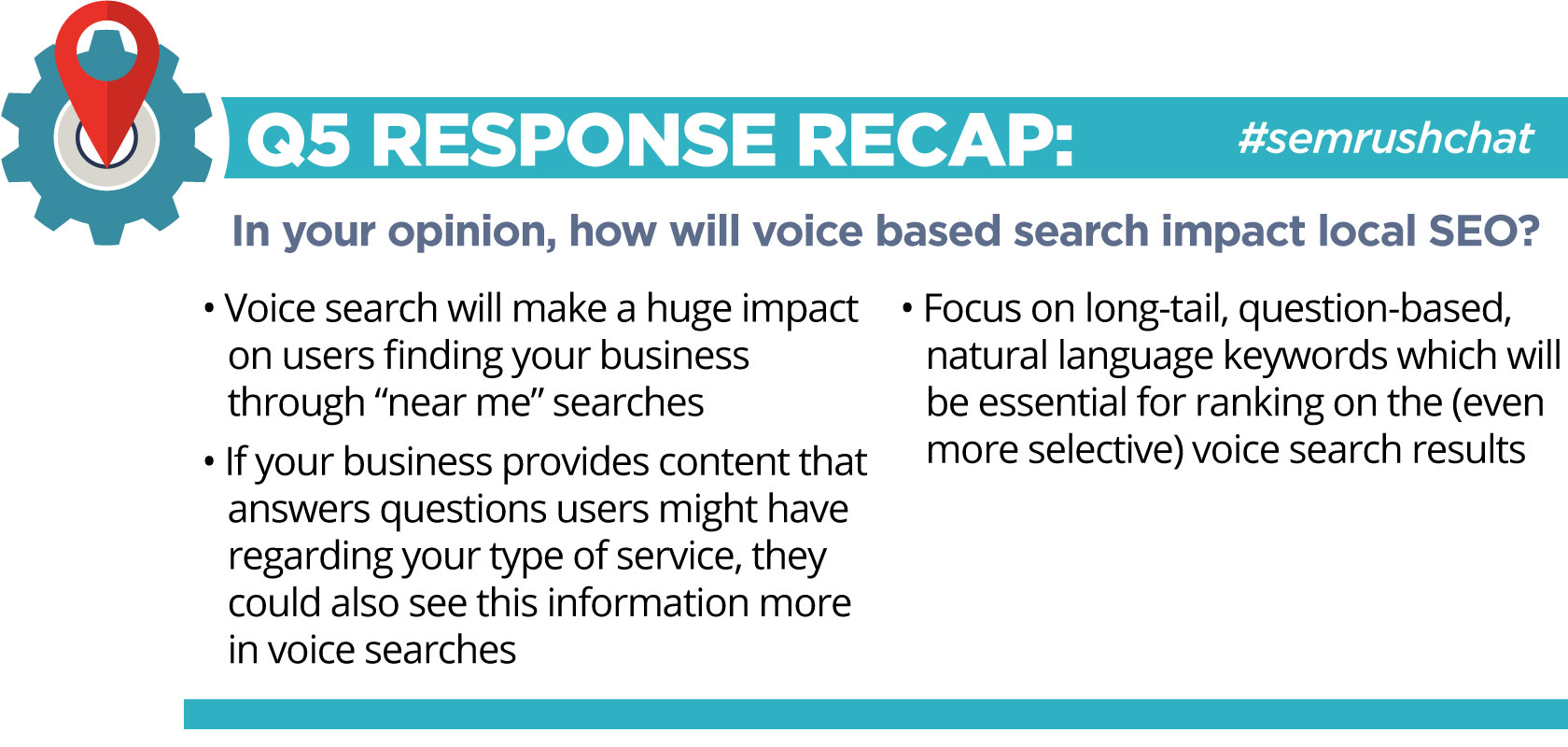
Q6. Local SEO forecast: What are your top predictions for the future of local SEO?
SEO is constantly changing, and while keeping up with the changes are good, staying ahead of them are even better.
Here are some of the top predictions our chat participants had regarding the future of SEO:
User-Focused Content
Expert Jesse McDonald believes that while user-focused content is important now, it will only become more crucial moving forward. In addition to creating content that users want, we will have to think about exactly how they will ask for it and the kind of answers they want in return. If a content team can correlate with a PPC team, they can easily spot trends in what their audience is looking for and adapt accordingly.
A6 I also think there is a huge opportunity for SEOs to work even closer with their PPC teams to enhance the relevancy in the content they are producing. What's working in PPC can greatly inform a local organic campaign. #semrushchat
— Jesse McDonald (@jesseseogeek) March 14, 2018
A6 For local brands, emphasis will be laid on quality. People are now looking for niche/ very specific attributes (e.g. handcrafted, vegan, green, etc.). You need to know the mentality of people in your town/city to dominate local search #semrushchat https://t.co/WNuoqj56hv
— Goddess of Tweets (@tweeterellaah) March 14, 2018
Voice Search Will Increase
Right now, a lot of the goal is to bring users to your site, but in the future, there will be an even bigger focus on getting your answers to your customer, particularly when it comes to voice search. You want to be able to answer questions as quickly as possible, whether users are asking an AI device the question or they are messaging you directly through live chat. If necessary, use chatbots and AI to increase response times for your customers.
A6: The future of local is to provide ways to answer your customers questions & concerns as fast as possible. Today’s customer is wants fast or they’ll go to the next guy. Utilize Chat Clients and Chat Bots to assist you with this. #semrushchat
— Shelly Fagin (@shellyfagin) March 14, 2018
a6 As for predictions of future local SEO - Voice Search Increases - Quality Customer Service is Vital (so you don't get a true bad review) & SMB's finding their Authentic Voice in Social #semrushchat
— Debi Norton (@BRAVOMedia1) March 14, 2018
Reviews Will Become Even More Important
Reviews have always mattered in terms of building trust and increasing conversions, and that will likely never change. Reviews are now search-engine friendly and maybe some of the first things that pop up in search engines, so value them and prioritize them accordingly.
A6 Your clients will become the answers to the queries of prospective customers, reviews will matter at every stage of the sales funnel. #semrushchat https://t.co/WNuoqj56hv
— Goddess of Tweets (@tweeterellaah) March 14, 2018
Increased Technical Focus
Now, a lot of SEO practices are still happening in a visible, user-facing way; our blog posts may be packed with keywords, for example. McDonald believes that while the content we are creating will be more user-focused, businesses will also be required to do more backend technical SEO work to stay competitive in the SERPs. Technical updates may need to happen sooner, and you may need to be more aggressive with finding and earning backlinks that benefit your users.
A6 I think the future of local search will be a mixture of being extremely user focused and putting more of an emphasis on the technical side of SEO. Focus on building links that also benefit the user. Monitoring and improving technical aspects of the site more often #semrushchat
— Jesse McDonald (@jesseseogeek) March 14, 2018
More Accurate Location Features
Search engines are getting smarter, meaning that they will be able to give customers better and more relevant results. This includes better location results, and many of our chat participants believe that Google will increase it is locational awareness to users’ and business’s benefits. This will make it easier to reach local customers, and for them to find you.
A6 It will get even more local - questions like “where are my sunglasses?” with answers like “they are on the couch” or “David next door has some you could borrow he bought last week at Aldi” will prevail. #probably #SEMRushChat
— Simon Cox (@simoncox) March 14, 2018
A6 I think as google is updating its location vetting & using latitude & longitude for biz locational awareness will get better with The lack of net neutrality it would make sense google buys the ISP information for this. Or finds better ways. Voice is here to stay. #SEMrushchat
— Thomas Zickell (@thomaszickell) March 14, 2018
A6) More and better technology in terms of location awareness and targeting sales opportunities. #semrushchat
— David Rosam (@davidrosam) March 14, 2018
A6: As people are getting more and more comfortable with location services on their phones, local SEO will improve exponentially. Giving businesses access to your location and phone's cookies will help them target and tailor to you as you even walk past their stores. #semrushchat
— Bria Charlei Baylor (@Impact_Write) March 14, 2018
A6.
• A bit more fragmentation in the market: Facebook/Here, Apple/Yelp, and other endpoints will be stronger than in the past, where Google was the only game
• Folks will be less tolerant of bad local search results, just like not being in the yellow pages was #SEMrushchat https://t.co/wYrWXi2c4d
— ???? ?. ??????, ???. (@ferkungamaboobo) March 14, 2018
Increased Mobile Importance
Having a mobile responsive site is already essential, and this is another trend that will continue. We are using our phones more on the go to make those “what’s near me” voice searches, and people need quick answers on mobile-responsive sites. If you want to stay competitive, being mobile-friendly is a necessity, not a luxury.
A6: It's only going to grow more important, since everyone is using a mobile device while out and about and needs to find something. #semrushchat https://t.co/kzQFMB4W84
— ThinkSEM (@ThinkSEM) March 14, 2018
A5 - This came up during yesterday's #PPCChat. Local businesses will/should adapt and optimize to meet the greater prevalence of "near me" search terms.A6 - See A5. Also, more mobile-friendly sites and more ways to target nearby potential indoor/outdoor customers. #SEMRushChat
— Marccx Media (@marccxmedia) March 14, 2018
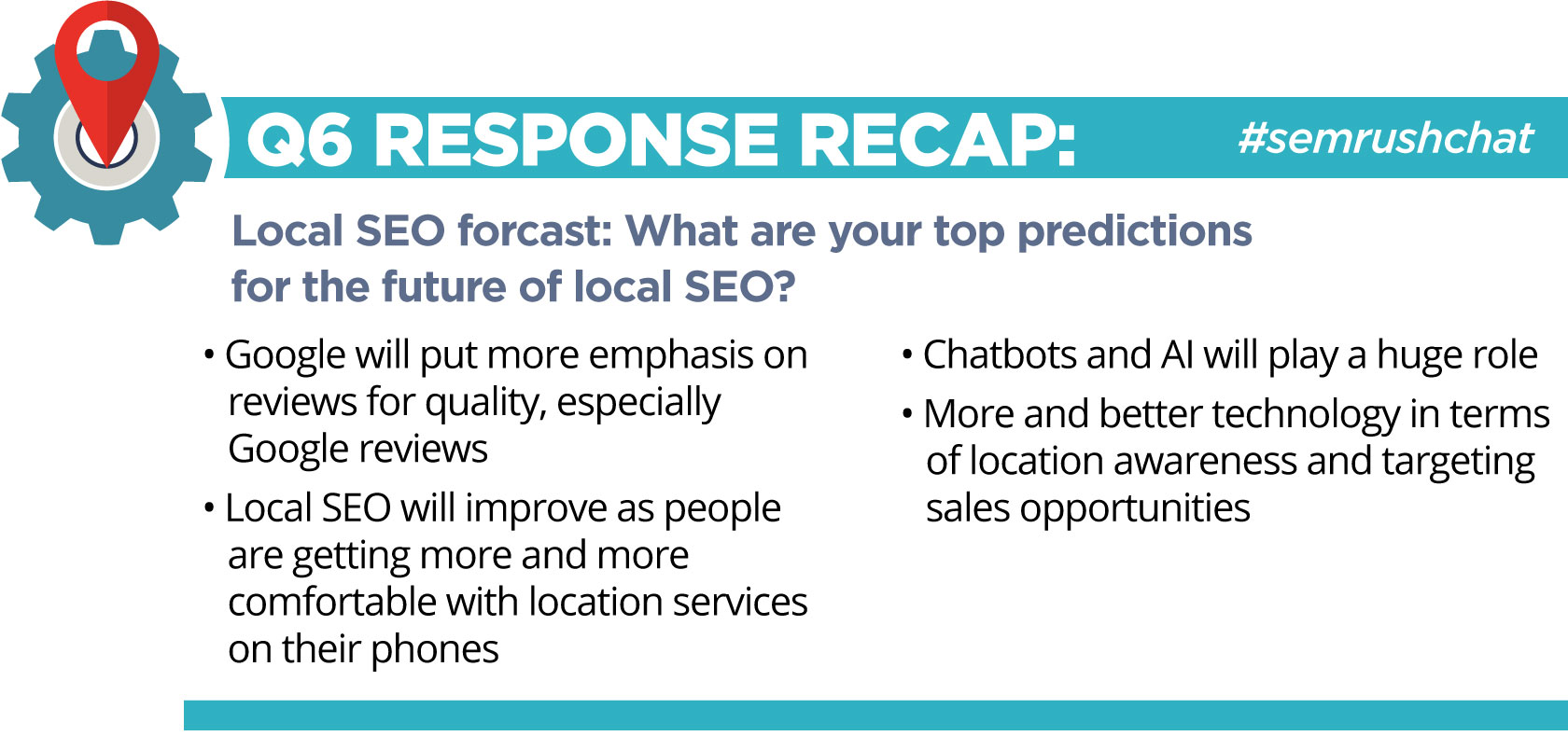
That's all for today! Join us this week on #SEMrushchat with Joe Martin, Head of Social Analytics at Adobe to discuss "How To Win Integrated Search-Social Campaigns!"
Innovative SEO services
SEO is a patience game; no secret there. We`ll work with you to develop a Search strategy focused on producing increased traffic rankings in as early as 3-months.
A proven Allinclusive. SEO services for measuring, executing, and optimizing for Search Engine success. We say what we do and do what we say.
Our company as Semrush Agency Partner has designed a search engine optimization service that is both ethical and result-driven. We use the latest tools, strategies, and trends to help you move up in the search engines for the right keywords to get noticed by the right audience.
Today, you can schedule a Discovery call with us about your company needs.
Source:





